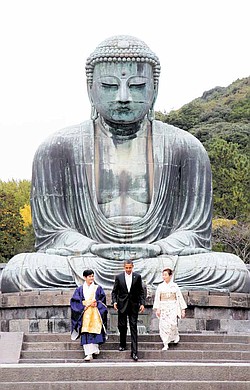Obama’s Asian trip shows limits
ASSOCIATED PRESS
President Barack Obama visits the Great Buddha of Kamakura with Michiko Sato, temple director, and Takao Sato, the 15th chief monk of the temple, at Kotokuin Temple in Kamakura, Japan, Sunday, Nov. 14, 2010. (AP Photo/Charles Dharapak)
Associated Press
WASHINGTON
President Barack Obama left Asia with a greater foothold in the emerging nations that could help shape the American economy for years. But his failure to deliver on his own high expectations on key economic issues served notice that the global stage is not nearly his for the taking.
The president returned to Washington on Sunday with mixed results to show from his longest foreign trip abroad as president, an exhausting 10-day tour through India, Indonesia, South Korea and Japan.
His first two stops yielded dramatic diplomatic successes and memorable images in two booming Asian democracies that will only become more important strategically to the U.S.
But the narrative soured once Obama arrived in Seoul, South Korea, for a meeting of the Group of 20 developed and emerging economies. Obama failed to achieve a free-trade deal with Korea that was to have been the biggest trophy of his trip, and instead of banding with America against China’s currency manipulation, several countries aligned themselves against the U.S.
The trip ended anticlimactically in Yokohama, Japan, with an uneventful gathering of the Asia-Pacific Economic Cooperation forum. But Obama has no time to breathe easy. Almost as soon as he gets back to Washington he’ll have to grapple with combative Republican congressional leaders at a White House meeting, then head back overseas for a summit of the North Atlantic Treaty Organization.
“Overall, it was a mix of successes and deep disappointments,” Mike Green, senior adviser and Japan chair at the Center for Strategic and International Studies, said of the trip. “Two great visits in India and Indonesia, a real disappointment in Seoul, and a reassuring but curiously unambitious visit to Japan.”
Obama, in some ways, achieved what he set out to do.
By spending so much time in Asia, undeterred by his and his party’s midterm election “shellacking” on the way out the door, he showed key nations how important they are to the U.S. agenda. And that, in turn, is an investment he expects to pay off over time — by loosening up trade and hiring opportunities for his own constituents, and by building up the base of democratic and America-friendly voices in a fast-growing region of the world where communist China looms ever larger.
“I think all of Asia is eager for American engagement and leadership,” Obama told reporters on Air Force One on the way back to Washington. “Everywhere in Asia, what I heard from leaders and people is that we are still central, and they want us there.”
 43
43

